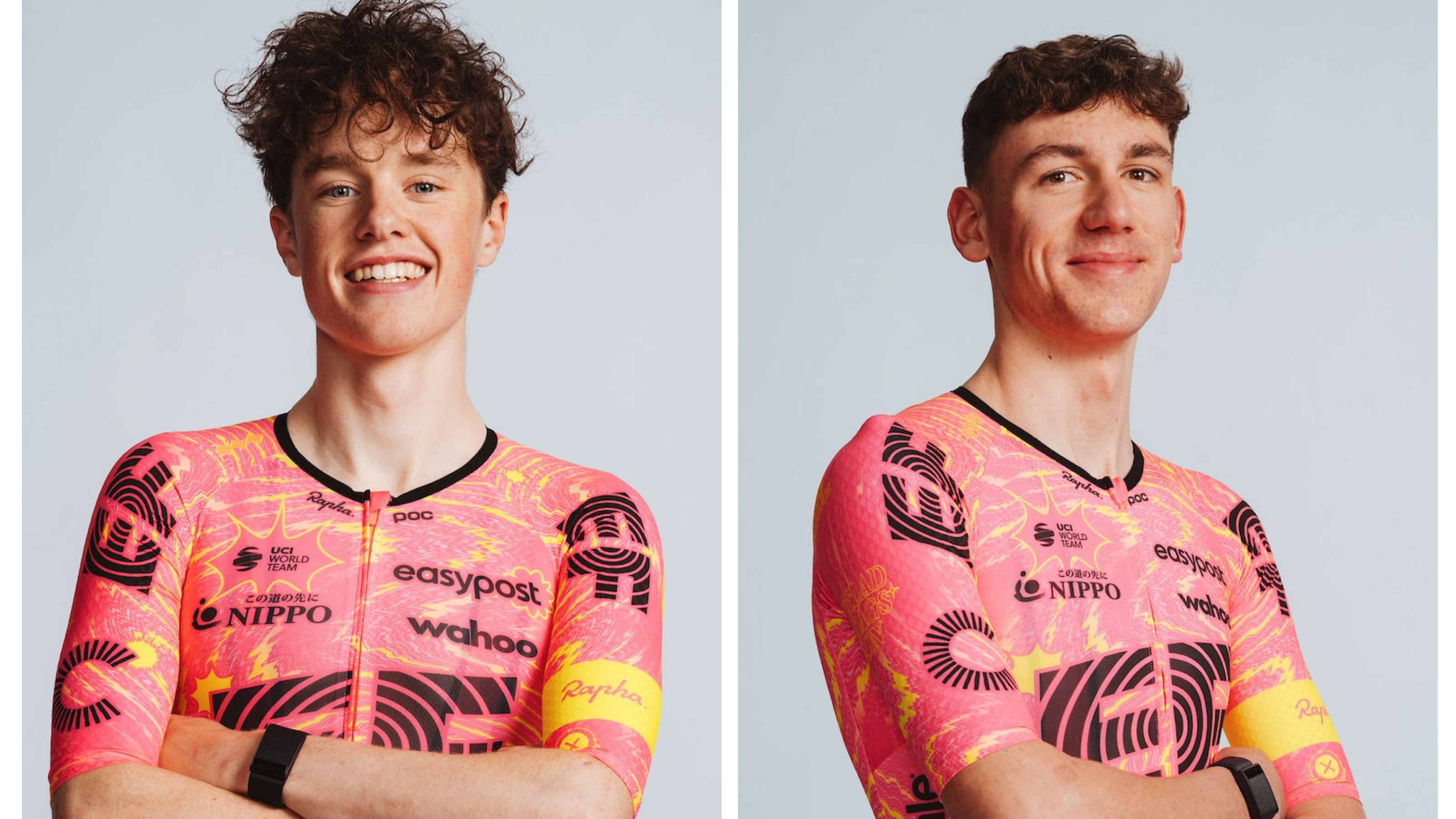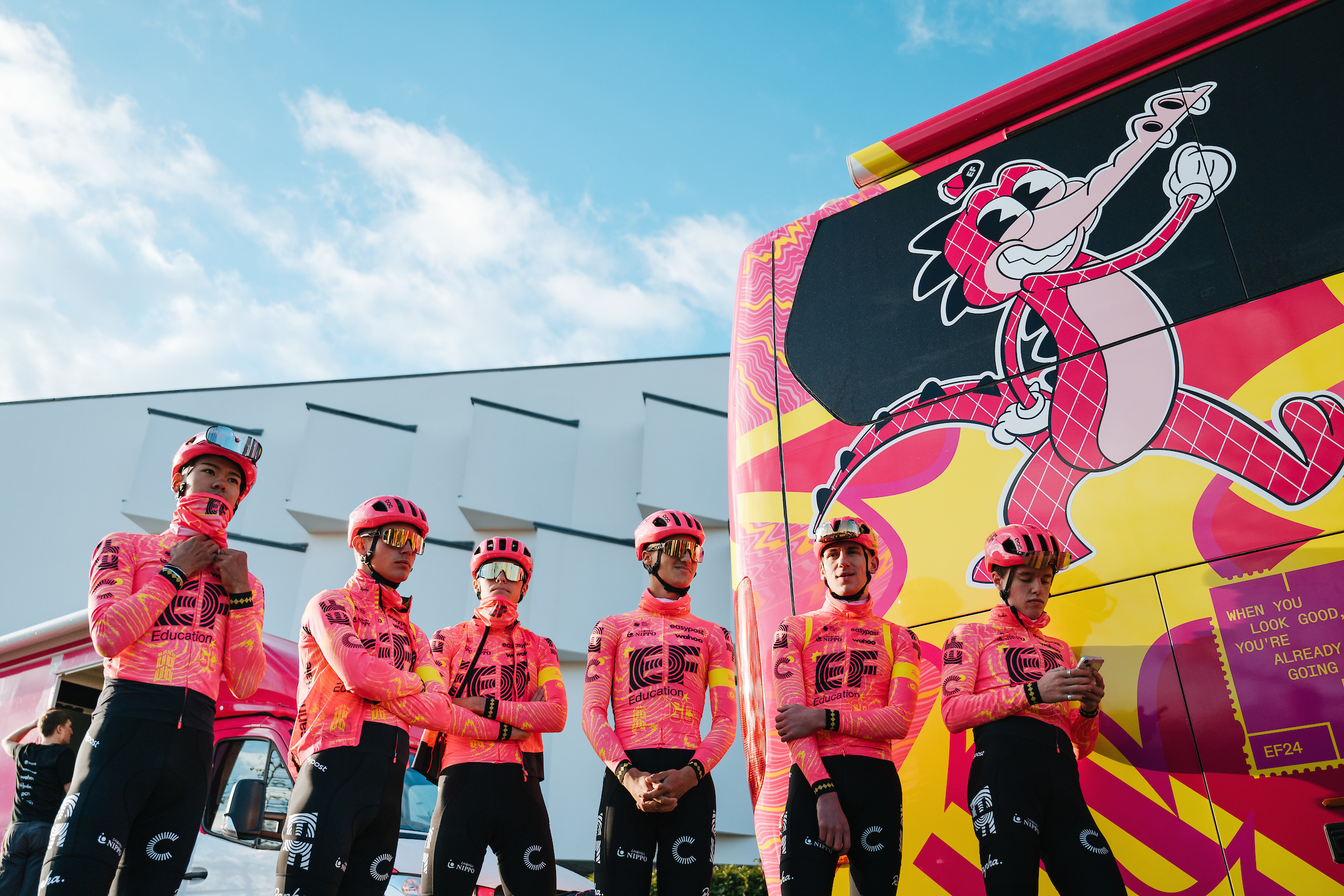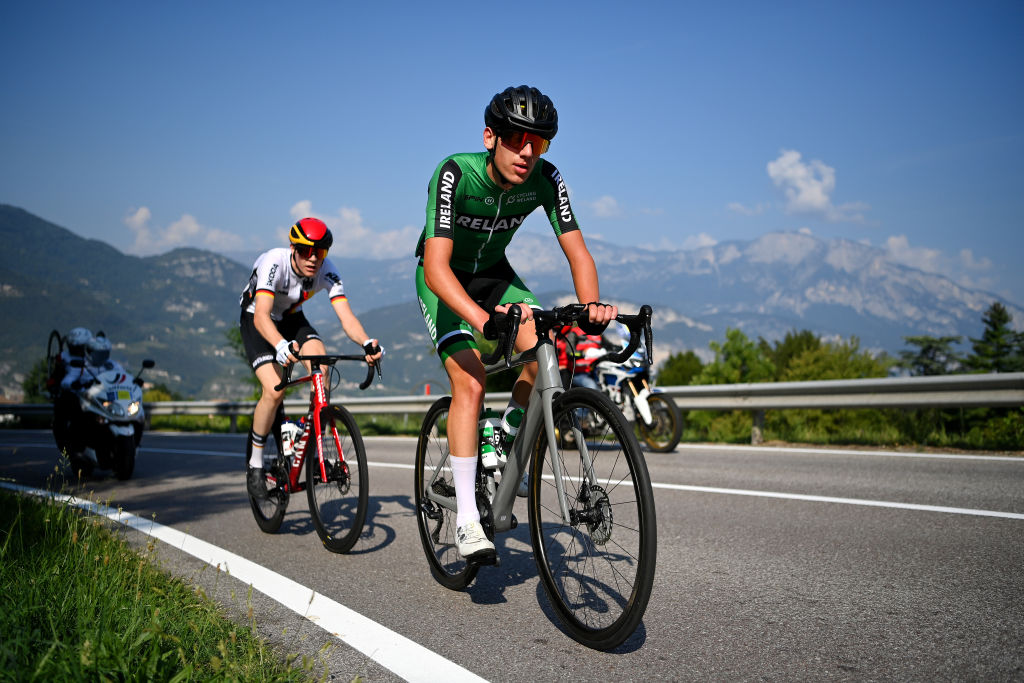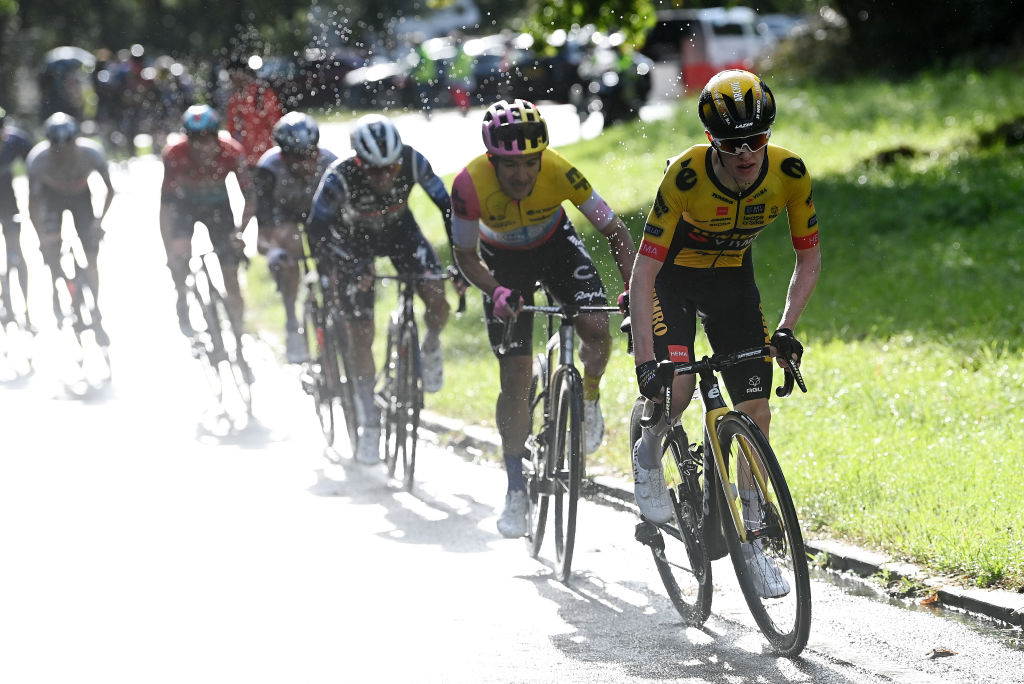
Have bike, will travel. Crossing the Celtic Sea to race has been a rite of passage for ambitious young Irish cyclists since Shay Elliott in the 1950s, but the game is changing in the 21st century. While Elliott didn’t move to the Continent until he was 22 years old, the Irish riders of today can’t afford to wait around, not when WorldTour teams are scouting talent at such a young age.
Archie Ryan and Darren Rafferty step up to the WorldTour in 2024 with EF Education-EasyPost, where they will join Irish champion Ben Healy, but they were both already based with teams abroad when they were juniors, and they spent their under-23 careers with squads expressly dedicated to preparing future professionals.
The 22-year-old Ryan is a native of Wicklow, and he began cycling with his twin brother Will at Bray Wheelers at the age of 12. After racing with Basque team Gaursa La Tostadora and British outfit Zappi as a junior, Ryan joined Jumbo-Visma’s nascent development squad in 2020, placing a promising eighth at that year’s Ronde de l’Isard.
A recurring knee injury ruined his 2021 season, but the gifted climber bounced back to place 4th overall at the Tour de l’Avenir in 2022. A month later, Ryan slotted into Jumbo-Visma’s first team for the Tour of Slovakia and turned heads by winning the toughest stage. Although the knee issued again kept Ryan off the bike for long periods in 2023, he won a stage of the Tour de l’Avenir and placed second at Il Piccolo Lombardia.
The 20-year-old Rafferty hails from Coalisland in Tyrone, and he also played Gaelic football, swam and ran in his youth before focusing fully on cycling at age 16. “I was getting pretty skinny for cycling and I was getting hit with a lot of shoulders playing football,” he laughs. “I had to pick one.”
Rafferty raced with Team 31 Jolly Cycles in France as a junior before joining Axel Merckx’s Hagens Bermans Axeon team in 2022. A strong time triallist and climber, Rafferty placed second at the 2023 Giro Next Gen before winning the demanding Giro della Valle d'Aosta. He is also the Irish under-23 time trial champion, a trait that runs in the family. That same night, his younger brother Adam claimed the junior title, while sister Aliyah later claimed the under-16 crown.
Cyclingnews caught up with Rafferty and Ryan after their first training camp with EF Education-EasyPost to discuss their journeys to this point and their plans for the road ahead.

Cyclingnews: You both had some big results as under-23 riders and attracted interest from a few WorldTour teams. Why did you choose EF?
Darren Rafferty: The big one for me was that there would be opportunity. I’d seen that with Ben Healy over the last two years. I liked the idea of racing a better programme than you would get elsewhere, which is important when you’re trying to develop and become a better rider, I suppose. You want to be putting yourself with the best when you can.
Archie Ryan: I’d agree with Darren completely. We all saw how Ben developed in EF and the opportunities he got, and it was a fairly easy pathway to see. That was the big draw. Apart from getting to be Darren’s teammate, that is…
CN: Was that part of the appeal? Which of you signed for EF first?
DR: Both of us have Gary McQuaid as our agent, so I’m not even sure of the answer to that question.
AR: I signed first! [laughs]
CN: How often had you crossed paths coming through the age groups?
AR: We only really met for the first time in 2022 at the Euros, right?
DR: That’s what I was going to say, we haven’t actually raced that much together, because Archie was exactly two years above me, so when I was under-12, he was under-14 and so on. But he’s not a bad lad, I suppose… [laughs]
AR: I remember l’Avenir last year, there was a huge crash and Darren pulled the group I was in back into contention, which was really cool, actually. That’s my first proper memory of Darren racing.
DR: I think my only memory of Archie before we raced together was that he and his brother Will were first and second in the under-16 race at cyclocross nationals on the same day I won the under-14. Apart from that, we hadn’t done too many races together until Avenir and Euros in 2022. And the Coppa San Daniele in October, of course, where Archie was dropping me on climbs and then all his teammates were sitting behind me all the way to the finish... [laughs] I’d rather be his teammate than race against him…
AR: It’s really cool to have D-Raff as a teammate. We have a good group of lads who we’re all friends with at EF already, so that makes the first step so much easier.
CN: Speaking of first steps, how did you get into cycling? Your younger brother and sister both race at a very good level, Darren, so I guess you came from a cycling background…
DR: Not really. My dad did a bit of leisure riding with Island Wheelers, but he never raced before I started. I went to cyclocross races in Dixon Park in Belfast about 11 years ago, and through that series, my brother and my sister joined the club. I have another younger sister who doesn’t like it at all, but the house revolves around cycling now, everyone’s doing bits and pieces and flying different places. I think it’s a good thing I wasn’t from a cycling family. My parents do everything for us that they can, but they also let us do our own thing.
AR: For me, it was that my dad joined the local triathlon club and then the cycling club, just for fun. I don’t think he’d done anything before. He brought me and my brother out to one of the training days. Will, my brother, started racing first and I thought, ‘Ah, I want to do that too,’ so that’s how I started with Bray Wheelers back in the day.
CN: At what point did you start thinking about making a career from cycling?
DR: I started at under-10, with cyclocross and mountain bike, and then I added track and road, but it wasn’t until my second year under-16 that I really started winning anything. The year I started getting coached was the year I started progressing quite a bit. I was top ten at the Youth Tour of Scotland and winning stage races in Ireland, but it wasn’t until I had a summer in France that I decided I’d defer going to university and fully concentrate on it.
AR: I started at under-12, and I was pretty mediocre. Youth racing was actually pretty hard because I’m a small guy – back then, I was like 40kg – so doing these flat races was never going to end very well for me. I never had any special results. I wouldn’t have thought I was good or realised that I had something until the Tour of Wales in my first year as a junior. That was sort of the first step in this process where I thought, ‘Ok, I can do this.’
CN: In previous generations, Irish riders tended to wait until they were almost 20 before finding clubs in France and trying to turn pro, but you both went to the Continent very young, as juniors. How did that come about?
DR: It was 99.9% through my personal coach, Stephen Gallagher of Dig Deep. Not only was he a great coach, but he had a lot of contacts. He knew a guy called Denis Gonzalez, who was involved with the federation in France, and he said they had a junior team near Toulouse I could join. Stephen told me that winter: ‘If you race in Ireland another year, your results don’t matter, and you don’t get to see how good the other riders in the world are.’
I was going to be finishing school that year and then deciding whether to go to uni or not, so this meant I could decide if I was good enough to do this for job or just to race at home. That was in October of 2020, and I’d barely raced all year with COVID, just a few TTs, so I felt I needed to get out of here. I finished up school and went away to France.

CN: Archie, you ended up in Spain, in the Basque Country.
AR: I did, but even before then, my brother and I were always getting across to race in the UK, where it was clearly a higher level of racing. The level at the top was pretty much the same, but in Ireland there were three or four guys who could do it, whereas in the UK it was 20.
DR: I think that’s an important point – you want to race against more people at the same level.
AR: Exactly. We had already started by trying to get over to the Northwest Youth Tour as under-12s and under-14s, because it was so much fun. My dad brought us over first and then we started going with Dan Curtin and company in Kanturk [the Cork club where Eddie Dunbar started out – ed.], so it started there.
But I ended up in the Basque Country because of Transition Year [an optional, non-examination year in the Irish school system – ed.] I thought there was no point in being in school for TY, and it was a good excuse to say I was going to learn a language while getting to race abroad.
It meant I could see what the level was and see if I liked it or not. From there, I went to [British squad] Zappi and then to Jumbo. I think it’s really, really important to get that experience as juniors abroad, because you just can’t do it in Ireland. We would have been stuck racing at A3 level, whereas these junior races in Spain were harder than a lot of A1 races. It was great to see whether I was in the ballpark of things and whether I enjoyed it. And I really, really did.
CN: Going to live and race on the Continent as a teenager has often been a school of hard knocks for Irish riders over the years. How was the experience for you?
DR: I was extremely lucky, I stayed with a DS from the team, Marc, and his wife Sandrine, who was a childminder and always at home. They spoke French all the time, so I was learning the language too. It was a bit of a soft landing, they took great care of me. I kind of got a home from home, so it was a nice transition at 17. It broke me in gently with the racing, too, which was every weekend, so you were never sitting in the house doing nothing for weeks. It wasn’t ‘hard knocks, toughen you up’ at all. I enjoyed my time there.
AR: I’d be very similar. You hear a lot of stories of people going to France and it being terrible, but I went to the Basque Country as a first-year junior with Gaursa La Tostadora, and I stayed in the team house with the U23 team. That was my first time living away from home and that was probably the most fun summer of my life, to be honest. I think I’m very lucky to be able to say that.
They took great care of me, but I was living on my own and I had to learn to be independent – cook for myself, clean my clothes and so on, you know – so I really that accelerated my development in a way. It was a great chance for me to develop as a person and not just on the bike. And it was also just a fun experience.
CN: You both went on to race for two of the best under-23 programmes in the world – Darren at Hagens Berman Axeon and Archie at Jumbo-Visma. These days, it seems like finding the right under-23 team is a bigger decision in a career than choosing a pro team later on.
DR: Making a good under-23 team is pivotal to where you go next and the doors it opens up. It was a massively important step, like you said. I won some stage races early on as a junior in France and at that stage I was thinking about finding a DN1 team there the following year and working my way up, like guys did in the 1990s and 2000s. But my coach Stephen suggested getting Gary McQuaid as my agent to see what options I had.
Gary started talking to under-23 teams on my behalf, but most of them weren’t interested because I hadn’t done a UCI-level race before. I was privileged that Axel Merckx decided to take a punt on me, and I signed before doing Euros or Worlds or anything. I’m extremely grateful that I landed there, I don’t think there are many better places you can go.
CN: In the 1980s, teams like ACBB were the places to be for ambitious young riders, but they weren’t exactly developing riders gradually for the next step to the pro ranks, it was sink or swim. At Axeon, on the other hand, developing for the future appears to be a selling point. What does that look like in practice?
DR: I think one of the nicest elements is that there’s no massive pressure on the rider, and there’s no clear leader before the race, it’s quite fluid depending on how people are feeling. And while it’s very professional, I would say it’s not the strictest team in the world either. The staff all do their jobs perfectly, but they don’t have a team coach or anything like that, so you can do things the way you would like to do them.
They provide the great staff and the opportunities, and then it’s up to us to capitalise on what they’ve given us. It's quite relaxed, like a family. You spend a lot of time with these boys, a lot of us were living in Girona together, and it becomes a team that you want to do well. You don’t just think of yourself. And if you know someone hasn’t got a contract, you’re trying to help them out in races at the end of the season.

CN: And Archie, how did you get to Jumbo-Visma and what was the set-up like?
AR: I got a couple of results as a junior that put me on the map, but the big thing is that I did testing for Jumbo-Visma. That testing itself was probably one of my better results, I think that’s what sold them. I was lucky to be part of the original squad in 2020, because they took thirteen riders for that first season, whereas in the years afterwards it was just one or two. On paper, I was probably the worst guy there, and any other year it would have been really difficult to make the squad.
I loved my four years there, there was nowhere I’d rather have spent my U23 career. I had a lot of ups and a lot of downs with injury, but when I managed to stay on the bike, it was really good. The guys were all super sound, so I’ve got some friends for life, and I’m very grateful for the opportunity. Just getting the foot in the door was so important, getting access to a brilliant calendar of UCI races. It made it easier to make the next step.
CN: You had big performances and results in your time at Jumbo, Archie, but you were plagued with a recurring knee injury too. Was there ever a point where you thought it just wasn’t going to happen?
AR: I had a couple of long breaks. In three of the four years, I had multiple months off the bike and each of those had their moments where I wondered if this was where I’d have to sack it all off, probably most of all in 2023. I’d had a really good year in 2022, I won my first pro race in Slovakia – sweet – but then I got injured again in the winter and I couldn’t get back on my bike again until June.
I was thinking, ‘If I don’t get back racing, I’m not going to get a team, what’s the point?’ So I was probably going to sack it off then but thankfully, the EF medical team really sorted me out and got me back on the bike. I’m super grateful to them. Without them showing interest and having me see their medical team, I might still be injured now. 2023 was the make or break in terms of the injury.
CN: Early in 2023, Jumbo-Visma had informed you that they wouldn’t offer you a pro contract. How did that news affect you?
AR: It was completely understandable. I was injured at that moment, so I probably wouldn’t have signed me [laughs]. There was also interest from other teams, so the goal for me was just not to be injured and then it would work out. It was still a little sad because I’d been at the team for four years, but thankfully we ended on good terms, and they were super happy for me to get a deal elsewhere.
CN: Darren, I think you already had the chance to turn pro in 2023 after your first year under-23 but you decided to wait. Why?
DR: It was just that I knew in my own heart I still hadn’t got everything out of myself to show WorldTour teams. I knew I could improve in the big stage races – maybe not in the performances, but definitely in the results. The first year I was a bit naïve in how to ride U23 races, I was throwing all my matches in the first half, and I quickly learned to be more cautious. I didn’t make a massive performance leap from 2022 to 2023, I just raced smarter.
I suppose I was also a bit higher up in the hierarchy of the team – the help I’d given out the previous year was reciprocated by newer riders, and without them, I wouldn’t have won the races I did. You can’t jump into a new team expecting to be the best rider and it’ll be the same with EF. You have to work through the ranks and show that you’re capable of putting in a performance before people trust you and back you up.
CN: How was your first training camp and contact with EF?
DR: Everyone was just really friendly, so I didn’t feel like I was jumping into an environment as a newbie. About ten years ago, when Rui Costa was world champion with Lampre-Merida, one of my local bike shops had a massive picture of him up on the wall, and I never imagined I’d be on the same team as these people. But you also have to get past the starstruck phase. It was a nice start, but now we need to get on with the job by seeing them as teammates rather than as idols.
AR: I found it really easy to fit in. Everyone was so friendly, and it was actually everything I thought it would be from the outside, which I feel isn’t always the case. They’re really nice and friendly, which is really cool. And it was great to meet all the big dogs. I’d always looked up to Esteban Chaves back in the day, so it was really nice to get to know him.
CN: The concept of defining yourself as a rider can feel almost moot these days, but what kind of riders do you think you are?
DR: I’d love to see myself as a stage racer, at least over one week, somewhere down the line, maybe in three years’ time, say. But honestly, I just want to improve my time trialling and climbing and learn from the riders around me, and I suppose I can naturally progress as a stage racer by doing that. That’s my aim, but I’m open to doing all sorts of races this year and maybe surprising myself.
AR: I would definitely be more of a pure climber, but I do want to develop into a GC rider. Down the line, in a few years, I’d love to have a crack at a Grand Tour, but there are obviously loads of stepping stones between now and then. I’d also love to go for the Ardennes one day. I’m good on the punchy stuff too, I don’t need a 40-minute climb to make the difference. Really, anything with a hill, I enjoy.
CN: What do your 2024 programmes look like? And what would make a successful 2024 season for you?
DR: I go to the Mallorca camp in January, and I’m provisionally supposed to start at Étoile de Bessèges and then another couple of races in Italy at the end of February and Catalunya at the end of March. It’s not a hectic first three months, but I think it’s the best way to break me in.
Goals-wise, I’ll see where I’m at in the first races and then I’ll see how high or low I set my limits for what’s achievable in the first year. But the biggest one for me is to stay illness and injury-free for as long as possible. If I can stay healthy and just keep chipping away at performances, that’s the most important for me.
AR: I’m starting in Down Under in January, an early start for me, which I’m super excited about. Then I’ll probably go to Laigueglia, Coppi and Basque Country at the start of the year.
Goals? I think everyone’s going to say it, but it’s to stay healthy and injury-free. Staying injury-free is the big one for me. Everything will sort itself out if I can just stay on the bike. And then on the bike, it’s just learning from the guys and from the squad. It’s a bit different for me, as I’ve done a few mixed races with Jumbo, so I have an idea of what I’m doing, but I still have to learn. I’d love to help out the big boys when I can, and then have a crack when I get the chance.







